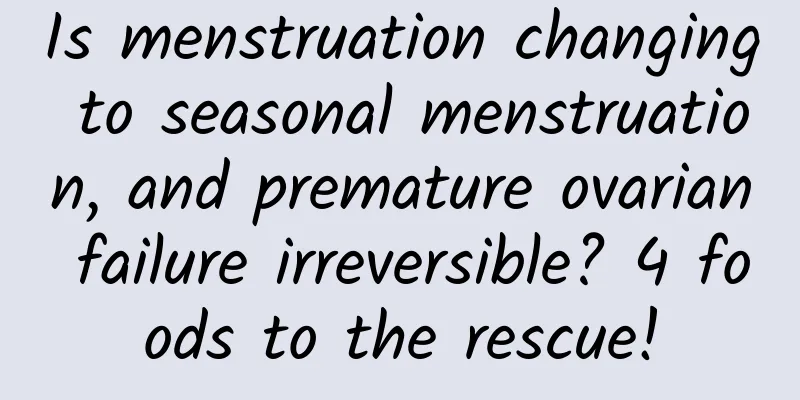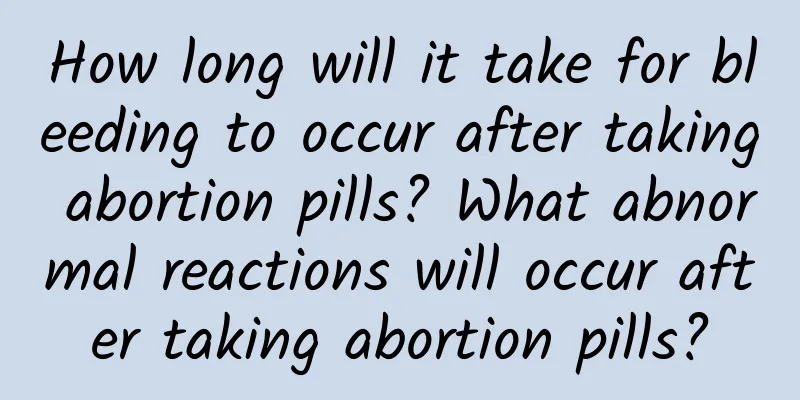Is menstruation changing to seasonal menstruation, and premature ovarian failure irreversible? 4 foods to the rescue!

|
Menstruation is so troublesome. You have to change sanitary napkins frequently and suffer from back pain, abdominal pain, edema, irritability, insomnia and other discomforts. How great would it be if women never had menstruation? Many young female friends have had similar thoughts, and some are even happy about the late menstruation, but they don’t know that these are warning signs of "premature ovarian failure"! Nutritionists say that premature ovarian failure can easily lead to obesity and infertility, which is a curse rather than a blessing. Weakened ovulation function and premature ovarian failure can lead to infertility "Premature ovarian failure" refers to the situation where women have no menstruation for more than 4 months, estradiol decreases and follicle stimulating hormone (FSH) increases abnormally, ovarian function weakens, and they cannot ovulate normally. They have irregular menstruation before the age of 40, or even no menstruation for more than half a year. If ignored for a long time, it will not only lead to infertility problems, but also cause ovarian failure and early menopause. Foreign studies have found that after women reach menopause, when the ovaries stop secreting estrogen, not only does the number of fat cells in the body increase, but the volume also increases by 30% compared to before, making them a relatively risky group that is more likely to gain weight. Why does the ovary fail prematurely? "Pressure" is a big suspicion! The incidence of "premature ovarian failure" is about 1% before the age of 40 and about 0.1% before the age of 30. In the past, premature ovarian failure was considered to mean that ovarian function would never recover. However, many women who were diagnosed with premature ovarian failure have intermittently recovered their ovarian function and even become pregnant naturally. Nutritionist Zhao Hanying said that the medical community has not yet found the real cause of premature ovarian failure, but analysis of the increasing number of cases of menstrual disorders in outpatient clinics in recent years found that most of them are related to factors such as excessive stress, abnormal diet, obesity, or incorrect weight loss leading to malnutrition. In the outpatient clinic, there was a 33-year-old office worker who had not had his menstruation for half a year due to too much work pressure. A blood test for hormones revealed that his prolactin level was too high, which in turn caused his ovaries to not ovulate. His diet and daily routine had not changed in half a year, but he gained 12 kilograms! Fortunately, if you can adjust your diet early, combined with proper exercise and physical conditioning, there is still a chance to change your fate, allowing the ovaries to resume normal ovulation function, female hormones to be normally balanced, and weight to drop naturally. Revitalize ovarian strength to avoid obesity + comprehensive nutritional care How to reverse premature ovarian failure or delay ovarian aging? Nutritionist Zhao Hanying said that the human body has many life-maintaining systems. Compared with the respiratory, detoxification, digestive and metabolic systems, the reproductive system is often ranked last in importance. Therefore, if you want to protect the health of your ovaries, you must first take care of other system organs. A more specific approach is to avoid obesity, maintain a regular work and rest schedule, not stay up late, get enough sleep; relieve stress and exercise moderately. In terms of diet, it is "comprehensive nutritional care", consuming a balanced amount of natural and fresh food, and eating less sweets, high-calorie foods and processed products. If you want to prevent premature ovarian failure more actively, you can prioritize the intake of four types of foods that can protect hormones while maintaining a healthy diet, including: 1. Omega-3 fatty acids: They are precursors of synthetic hormones and are mostly found in flaxseed seeds and deep-sea fish. However, because they are polyunsaturated fatty acids, they are easily destroyed by heat. Therefore, it is recommended not to use flaxseed oil for high-temperature cooking. Cold dishes can retain more nutrients. 2. Vitamin C and E: Both have antioxidant effects, can eliminate free radicals in the body, protect organs from oxidative damage, and maintain normal physiological functions of cells. 3. Soy foods: Soybeans, black beans, edamame, soy milk, tofu and other bean foods are rich in soy isoflavones, which can play a similar role to estrogen in the human body; soy fiber can stimulate gastrointestinal motility, promote fat metabolism, and reduce the risk of obesity. 4. Vegetables and fruits: Various fruits and vegetables are rich in various phytochemicals, have antioxidant and anti-free radical effects, and the fiber in fruits and vegetables helps smooth bowel movements. Generally, adult women should consume at least 5 servings of vegetables and 2 servings of fruits every day. For high-risk groups for premature ovarian failure and abnormal menstruation, it is recommended to consume 7 vegetables and 2 fruits, with each serving of vegetables or fruits being about 100 grams. |
>>: Reverse aging! 8 nutrients you must eat to fight aging
Recommend
What are the symptoms of cervical warts?
Genital warts may be familiar to many people, but...
How to deal with abortion after it happens
How to recuperate after an abortion? With the con...
Women with cervicitis are most afraid of three kinds of fruits. Women with cervicitis are recommended to eat these three kinds of fruits
Cervicitis is mainly caused by inflammation of th...
What is the reason for cervical bleeding? Cervical bleeding may be caused by these 3 factors
Some women may find themselves bleeding when goin...
First aid measures after ectopic pregnancy rupture
Generally, ectopic pregnancy patients will experi...
What causes vaginitis?
Vaginitis is a gynecological disease that trouble...
Why do I get uterine fibroids? How to treat uterine fibroids
Uterine fibroids are the most common tumors of th...
How long does it take to puncture a chocolate cyst?
How long does it take to puncture a chocolate cys...
What examinations do women need to do before having an abortion?
Many women get pregnant without taking any protec...
How to distinguish threatened abortion from menstruation? Why are threatened abortion and menstruation confused?
Some people are careless and think that they have...
Symptoms of harm caused by pelvic inflammatory disease
What kind of harm will pelvic inflammatory diseas...
Experts briefly analyze the dietary considerations for abortion
For women who choose abortion, proper diet is ver...
Characteristics of benign ovarian cysts
Characteristics of benign ovarian cysts: Generall...
Peanuts are a vegetarian dish! Gout gastroenteritis Do not overdose
Crispy and crunchy peanuts are not only delicious...
What kind of surgery is needed for uterine fibroids? How big is the uterine fibroid that requires surgery?
What surgery is needed for uterine fibroids Uteri...









